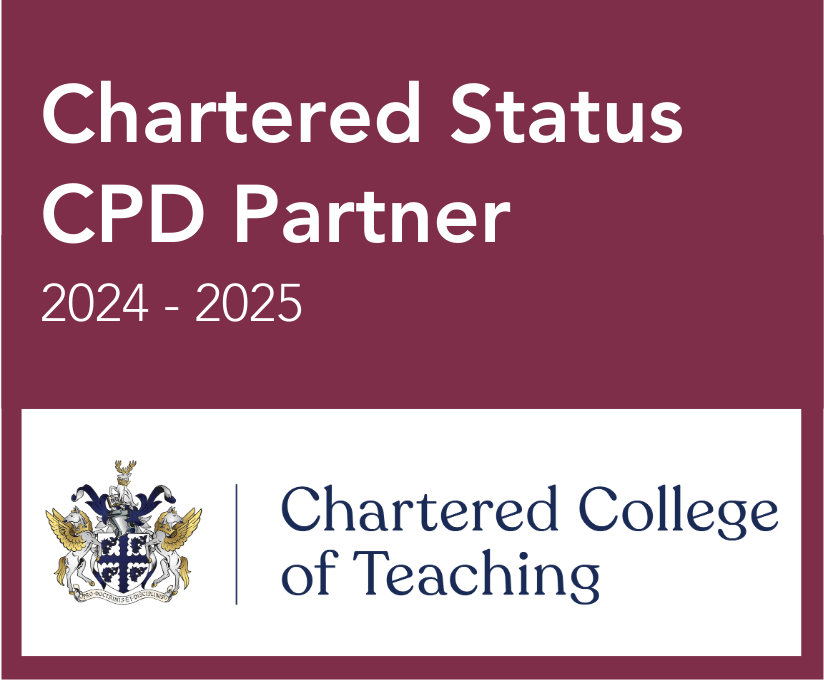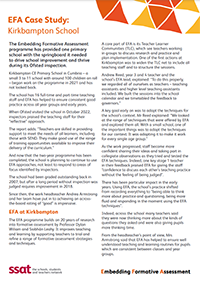Embedding Formative Assessment in Primary Schools
Building on over 20 years of research by Dylan Wiliam and Siobhan Leahy, this programme has shown to make a positive impact on learner engagement and achievement.

Start date
2-year programme, flexible start date

Need more information?
Get in touch or call 020 7802 2300
Embedding Formative Assessment is crucial for fostering a culture of continuous improvement in education. By incorporating formative assessment practices, teachers and learning support staff can gain valuable insights into children’s learning, identifying gaps in knowledge, and misconceptions, adapting teaching to meet individual needs, ultimately enhancing learner achievement and engagement.
Why do the Embedding Formative Assessment Programme?
- Boosts learner engagement: By using engaging formative assessment techniques, this programme encourages children’s participation, creating an enjoyable learning environment where learners feel accomplished and motivated to learn more.
- Enhances teacher responsiveness: Teachers will discover effective methods to consistently gauge children’s progress, enabling them to gather valuable information in every lesson, thus enhancing the quality of teaching and learning across the school.
- Creates a culture of collaboration: Through Teacher Learning Communities, colleagues can collaborate, share ideas, and support each other, fostering a culture of professional growth within the school.
- Enhances achievement: The EEF’s report (2019) highlights the positive impact of this program on learning outcomes.
The sharp focus on formative assessment that the programme provides has meant that teachers are more mindful at the planning stage of making decisions around whole class assessment, and that adaptive teaching strategies are evident more frequently around the school.
One of the Headteacher’s initial hopes for the programme has also been borne out, with workload from marking being reduced, due to more in-the-moment marking and verbal feedback.
Mersham Primary School, Kent
How does the EFA programme work?
The two-year EFA programme, based on extensive research by Dylan Wiliam and Siobhan Leahy, focuses on long-term habit change to improve formative assessment practice among teachers.

Process:
- Teacher Learning Community (TLC) groups (8-14 staff) meeting monthly for 75 minutes
- Workshops facilitated by your selected TLC leaders
- Programme fully resourced with agendas, handouts, recordings and templates.
An expert EFA mentor provides tailored support and training to ensure effective implementation and sustainable impact for the school.
This support will include:
- Practical planning support for readiness
- An initial day’s training in-school for school leaders and teachers leading the TLC meetings
- Regular email/telephone contact with an assigned mentor with key reflection and planning points
- Two in-person visits at the end of year one and two to review the programme and plan the next steps in implementation
- A wide breadth of supporting resources, exemplars and case studies which can be used to support and maximise the impact of the programme
You will need to:
- Commit to the programme for two-years with an understanding that teacher habit change takes time
- Free up time and resources to implement the programme with fidelity
- Treat implementation of the programme as a process, planning and executing it in stages working with your mentor
Book a call with the EFA team
Speak with the EFA team to learn more about the benefits of Embedding Formative Assessment in your school.
Book a call
Why Embedding Formative Assessment? Viewpoints from Kirkbampton School
The pupils…
Mrs Armstrong agreed that the pupil voice work has given the children ownership of how the EFA techniques are implemented and thus of their own learning too: “That ownership has been very empowering for the children.”
The teachers…
One key stage 1 teacher in their feedback praised EFA for giving the staff “confidence to discuss each other’s teaching practice without the feeling of being judged”.
Using EFA, the school’s practice shifted from recording everything to “being able to think more about practice and questioning, being more fluid and responding in the moment using the EFA techniques”.
Senior Leadership Team…
Mrs Armstrong said that EFA has helped to ensure well understood teaching and learning routines for pupils which are consistent between classes and year groups.
Ofsted…
“Within the inspection itself, the inspector was very keen to hear about the model, how we were using it, and how it was research-linked.”
“She could see that we were invested in it and the impact it was having on effective feedback – verbal, written, whole-class feedback. She could see that impact in the teaching and with the children as well.”
SSAT is now partners with the Chartered College of Teaching
Those who complete the EFA programme will be able to apply for an exemption from the Development of Teaching Practice Award for teachers (20 credits).
Date and location
In-person training and online support
EFA Case Study: Kirkbampton School
The Embedding Formative Assessment programme has provided one primary school with the springboard it needed to drive school improvement and thrive during its Ofsted inspection.

Any questions?
Contact us or call 020 7802 2300.
Get in touch




